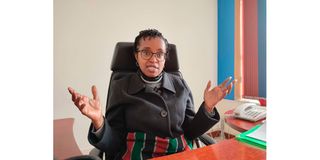Njeri Mucheru, a beacon of hope for abused women

Njeri Mucheru, who suffered emotional abuse from her husband speaks to nation.africa at her Nairobi office on December 3, 2021.
What you need to know:
- In 2013, Njeri Mucheru parted ways with her husband and agreed on co-parenting.
- Together with five friends, she started a shelter for abused women, Mary's Manger in 2016.
- The shelter in Limuru accommodates women with their children.
Njeri Mucheru is a lively woman and her smile is fabulous.
Underneath her cordial feel is a heart that has healed from the painful stings of emotional abuse struck by her ex-husband.
She was nine months pregnant when she found out her husband was a serial cheater. That was in 2012.
She was resting in the house when a friend called to find out if she was in the neighbourhood so he would pass his regards. He had seen her husband's vehicle in a parking yard outside a flat in Nairobi.
She called him to find out if everything was fine with him. In response, he informed her, he was in the supermarket. Fired with suspicion, she drove to the flat only to see his car parked there.
Ms Mucheru then called him with an urgent appeal to rush her to hospital.
Soon as she hang up, he had a door open in one of the floors and when she peeped through her car window, she saw him rush down the stairs.
"I walked out of the car and hid behind a pillar. As he opened the door to his car, I came from the hiding and told him 'As you can see, I'm okay. Just go back and finish whatever you were doing,” she recalls.
He didn't return to his mistress. Instead, he drove home.
She assumed her husband would be remorseful and perhaps ask for forgiveness. That was just a dream.
"He gave me a lecture telling me how I was not treating him well. He said I would never stop him from getting happiness from elsewhere. Then later I realised he had a string of women," she says with an exclamation.
"That really broke me to the extent I almost lost my mind. I ended up being hospitalised and eventually, I was diagnosed with bipolar."
For months, she hoped things could change even as she persevered his emotional abuse including flirting with other women on phone before her.
She tried to implore him to save their marriage but he wasn't interested.
"He told me 'I married you to please my mother. I don't believe in marriage or love,'" she says.
"I reached a point I gave up on him.
I decided every marriage is worth fighting for, but there is no marriage worth dying for."
In 2013, she left with her children. They finally got divorced and agreed on co-parenting.
Her end of marriage taught her a lesson.
"I came to realise, the buck stops with you even if you have people around you who love you," she says.
"It is me who has to decide I am going to leave or I am going to stay .There is nobody who can make that decision for you."
She says the best way to deal with domestic violence is to take the woman away from the violence. This would help her to think through her situation with a clear mind and make an informed decision on her life going forward.
For this reason, together with five friends, she started Mary's Manger in 2016. The shelter in Limuru accommodates women with their children.
Before Covid-19 hit in March last year, they had nine women and 30 children. They stopped admitting new survivors due to the spread of Covid-19. But they hope to resume in January.
She says at Mary's Manger "We take care of you, by the time you leave, you are happy. You are not confused anymore, you know what you need."
At the shelter, the women are offered psychosocial support. They secure casual jobs in the neighbourhood for those who cannot be reconciled with their spouses or return home.
She discourages women against perseverance unless there is a mutual concerted effort to save the marriage.
“Don't be sad that 'I am no longer going to live in Muthaiga, Oh I'll live in Kayole’ or be concerned that people will say 'my marriage has broken down,” she advises.
"Sit yourself down and remind yourself how it is to be happy. The children you are allowing to see you being abused, are going to become abusers themselves or come up with defective ways of dealing with broken relationships
She concludes: "A miserable mother cannot raise happy children. You must be happy so that your children can be happy. Whatever is in you is what flows out of your mouth and you cannot help it.”
Ms Mucheru, a lawyer and runs a law firm in Nairobi.





